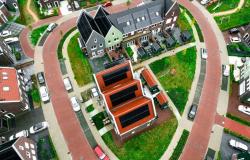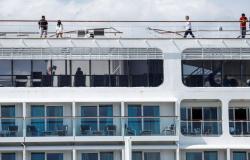•
Wednesday April 3, 2024 at 7:00 PM
Special On Tuesday evening the news came out that Merijn Zeeman is leaving Visma | after the current cycling season Lease a Bike. The sporting director has been dreaming of a job in football for years and now sees it come true. Later this year, Zeeman will start working as a director at football club AZ Alkmaar, from the city where the North Hollander was born. A nice compliment for the cyclist, who wears Visma | Lease a Bike transformed from the laughing stock of the WorldTour to the best team in the world. A timeline.
As a cyclist, Zeeman himself was not a high flyer. He briefly reached the Continental level at Tegeltoko, the predecessor of what later became the renowned Löwik Meubelen. His best result, which can be consulted online, is nineteenth place at the National Championship for U23s in 1998. Zeeman was then nineteen years old. He continues cycling until 2001, but then hangs up his steel horse. Zeeman has been driven by coaches from an early age. He admires Rinus Michels, Johan Cruijff and Louis van Gaal when he starts as a student at the ALO in Amsterdam after the turn of the century. In addition to his studies, Zeeman gave spinning lessons in a sports and fitness center.
First steps as a team leader
During that period he also started working at the Zaanse amateur association DTS (Door Training Sterk), where he started pioneering together with childhood friend Aike Visbeek. They found each other as teenagers by playing Championship Manager (now the popular Football Manager) for hours on the PC. In the depths of English football they looked for cheap talents that everyone overlooked to strengthen their fictional team. Even today, Football Manager is all about making strategic choices that will help you work your way to the top of the game. There is no such thing as playing yourself like in the FIFA football games. It is and was purely about strategy.
Both men position DTS as a training team and in 2004 they had well-known names such as Floris Goesinnen, Wouter Mol, Frank Kwanten, the Pole Piotr Mazur and the German Henrik Werner in their team. With bicycle sponsor Moser and the local Albert Heijn from Paterswolde in Groningen, their team is a Continental formation in 2004. A combination between North Hollanders and Groningers, in which Bert van der Tuuk also plays a major role. A year later, the Trentino region also joined as a sponsor, including riders such as Maciej Bodnar and Huub Duijn. A kind of B-team, because with Skil-Moser there will be a stronger A-team next to that team in the same structure.
Zeeman at Tegeltoko in 1998, far left – photo: Cor Vos
However, at the end of 2005, Van der Tuuk and co’s project collapsed. The reason? According to main sponsor Skil – which withdrew – the team’s ambitions were too high. Visbeek and Zeeman then moved to the continental Krolstone, where they received, among others, Pim Ligthart and Lieuwe Westra. Visbeek moved to Sweden in 2005 and focused on his work at Swedish Cyklesport since 2008. Krolstone had a very successful year that season under the leadership of Zeeman and Kwanten. Reason enough for Iwan Spekenbrink to bring the 30-year-old Zeeman, who lives in Amsterdam, to his team. A cultural change was needed there.
The switch to Skil-Shimano
Het Parool writes at the beginning of 2009 that Skil-Shimano has not invested in big names, but in the framework to increase returns. Zeeman gets a carte blanche from Spekenbrink. The Dutch team (now Team dsm-firmenich PostNL) is still a ProContinental team and has only one really well-known name in the selection with pure sprinter Kenny van Hummel. Not necessarily easy material to work with. Zeeman immediately stood out with his statements at the first training camp, after Spekenbrink bought two houses in Hengelo to bring riders together for training and scientific tests.
“With modern technology, a rider can send me all his training data, but that is not enough. Coaching works much more effectively when you have the riders with you. This has long been normal in other sports, but apparently not in cycling. I find it strange that in a sport that involves so much money, more is not done to make people better. Cyclists still have to go out with a program and the message that they have to be good when it counts. How they can ensure this is something they will have to figure out for themselves. As a trainer I want to be part of that process. If a rider does not ride well, I am partly responsible.”

Zeeman was given plenty of room to grow under Spekenbrink – photo: Cor Vos
At Skil-Shimano, Zeeman introduced individual training schedules, brought in a sports psychologist and a nutritionist to the team. His message was clear: “A number of riders still have to get used to this approach. But we will certainly intensify this process. We no longer need riders who do not accept this at Skil-Shimano. Top sport is sacrifice.” When he brought Marcel Kittel to the team via old acquaintance Visbeek in 2011, the Spekenbrink formation was gone for good. A year later, signings John Degenkolb and Tom Dumoulin also hit the mark. Zeeman then brings in Visbeek.
From everything to nothing
However, the collaboration between the two childhood friends is short-lived. Zeeman is offered a job as a team leader at Rabobank, which has been one of the leading teams in the world for years. The Alkmaar native gets the opportunity to work with (aspiring) world leaders such as Lars Boom, Theo Bos, Robert Gesink, Wilco Kelderman, Steven Kruijswijk, Michael Matthews and Bauke Mollema. “This year I have reached a point where although my work is not finished – because it is not – it is nearing completion. I thought: if a new project comes along…. and then Rabobank reported,” Zeeman said in July 2012.
“There were many conversations and finally I decided to do it. Director Harold Knebel has asked me to bring more dynamics to the team, which is exactly what I like to do. There are some tremendous talents in the team, I look at that potential. It’s not directly the promotion, that doesn’t play a role. It’s about us all putting our shoulders to the wheel, team management, riders, trainers, everyone. I play a role in all of that.” But just before he was to start there on November 1, the entire Rabobank foundation collapsed in mid-October. And so from then on, Zeeman had to start with a blank sheet of paper. The challenge became greater.

No luxury at Rabobank, but starting over via Blanco and Belkin – photo: Cor Vos
In the years that followed, Zeeman was mainly a team leader. The general public first got to know him through the documentary Bau en Lau, about the 2014 Tour de France. The team was then called Belkin and Zeeman was one of the team leaders during that Tour. The North Hollander stands out as a young nerve who has also mastered swearing. That year, the team lived for the last time on Rabobank’s money. At the end of 2014, no fewer than twelve riders will leave the team, including strongmen Boom and Mollema. Only four return for that. The 2015 season is the first as LottoNL-Jumbo, but also the worst year in the team’s history.
The prelude to success
The team must and will change course. The team makes a desired purchase with Dylan Groenewegen and believes in the then noble unknown Primož Roglič. After a great spring for Sep Vanmarcke, Steven Kruijswijk almost winning the Giro d’Italia, Robert Gesink’s stage victory in the Vuelta a España and the successes of Groenewegen and Roglič, team boss Richard Plugge continues. At the end of 2016, he promoted Zeeman to sporting director, which means that the North Hollander will be in control and will from then on be ultimately responsible. The highlight of the first year is two stage victories in the Tour, by Groenewegen and Roglič.
The team will continue to develop in 2018. Zeeman invests a lot in the Dutch top sprinter and their Slovenian pearl. With success, because that season both victories came together. For example, Groenewegen wins Kuurne-Brussels-Kuurne, Roglič takes the overall victory in the Tour of the Basque Country and together they are good for three stage victories in the Tour. The Slovenian also finished fourth that round, Steven Kruijswijk finished fifth and a few weeks later fourth in the Vuelta. That summer, Zeeman made his mark even further: he convinced the highly coveted Wout van Aert with his plan to choose Jumbo-Visma. He also brings in Tony Martin.

The five leaders at the end of 2019, with Plugge and Zeeman (right) – photo: Cor Vos
That’s not all. Still with Championship Manager in mind, Zeeman is trying to find robust talent for his team. Young riders with special qualities, but who due to circumstances have never been able to get the most out of it. When the head coach introduced Jonas Vingegaard that same summer, virtually no one had ever heard of him again. In 2019, Jumbo-Visma will take the next sporting step under Zeeman’s leadership. With Van Aert they have the much-desired finisher in the classics and Roglič is lord and master in the week-long stage races. The Slovenian also wins the first big tour in the autumn (with the Vuelta). JV.
History written
After that the spell is completely broken. Jumbo-Visma is pushing forward and is fully aiming for the overall victory in the Tour de France 2020. That seems to be working, but just before Paris things go wrong. First, Zeeman himself is in the news because he was thrown out of the Tour after he crashed into a UCI official. Sitting on the infamous folding chair somewhere on a road during the last time trial, he watches with dismay that leader Roglič still gives away a certain winning margin on La Planche des Belles Filles. No first yellow jersey, but second behind Tadej Pogačar. Furthermore, it has been a top year for Zeeman and the team, with victories in Milan-San Remo, Liège-Bastogne-Liège and Strade Bianche.
In 2021, the team will win the Amstel Gold Race, the Vuelta a España for the third time in a row and four stages in the Tour. Once again Pogačar is the best, but the now polished ruby Vingegaard shows that the Slovenian is vulnerable. With the invigorated Dane, Zeeman and his team finally managed to win the Tour de France a year later. In addition, there are countless victories in major competitions and Jumbo-Visma is once again crowned the best team in the world in the UCI Team Ranking. When Zeeman then explains the plans internally in the winter for the 2023 season, he receives a letter from Jos van Emden. The senior believes that the ambitions are out of proportion and raises the alarm.
Jumbo-Visma set itself the goal of winning all three Grand Tours in one season. Never shown before. But that is exactly what Zeeman and Plugge are trying to do. It is the team’s new philosophy: to acquire a place in sports history, where their team quickly coincides with the tikitaka of FC Barcelona, the Chicago Bulls led by star basketball player Michael Jordan and New Zealand rugby superpower All Blacks. Zeeman’s plan became reality: Roglič won the Giro, Vingegaard the Tour and the two stood on the podium of the Vuelta together with final winner Sepp Kuss. It simply can’t get any better in cycling.
The only gap in Zeeman’s record are victories in the Tour of Flanders and Paris-Roubaix. For that he will have to return to racing at some point. But for now, a new challenge awaits at football club AZ, or Alkmaar-Zaanstreek. It could hardly be better for Zeeman: he started racing in Zaanse and now he is working with a football vision in his hometown of Alkmaar.

Zeeman after the successful year 2023 – photo: Cor Vos
Tags: Merijn Zeeman cycling professor Zaan region football boss Alkmaar
-










